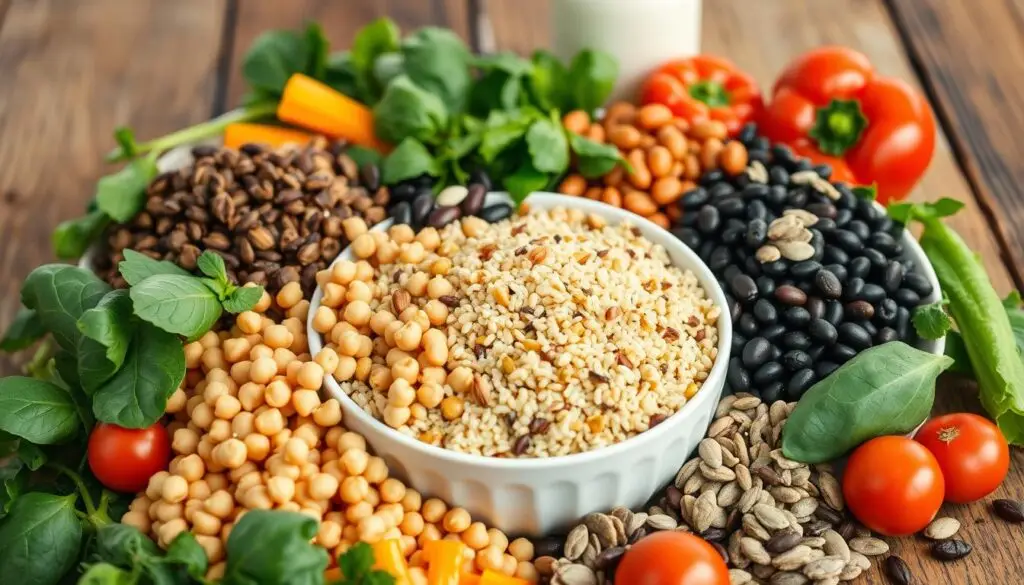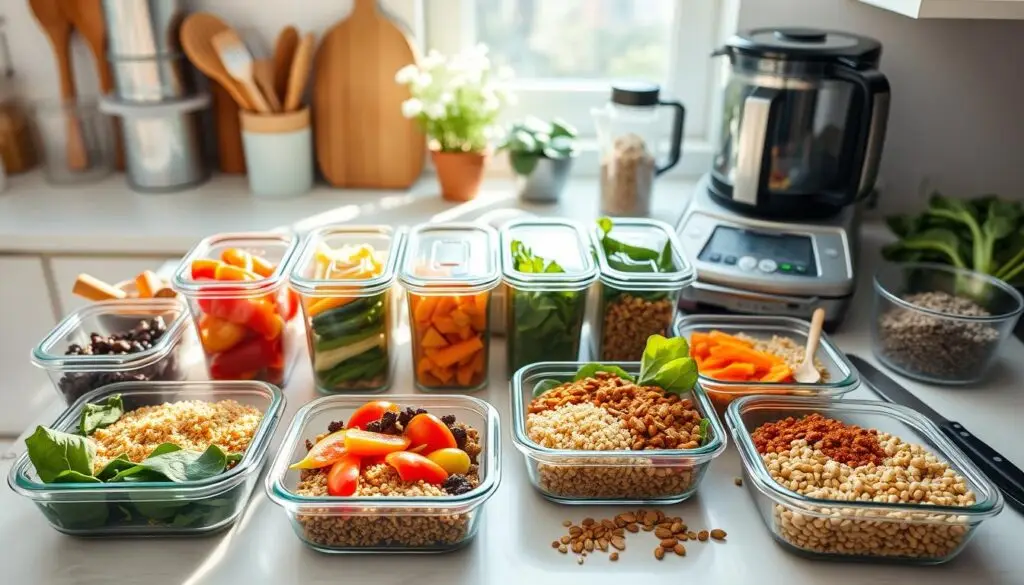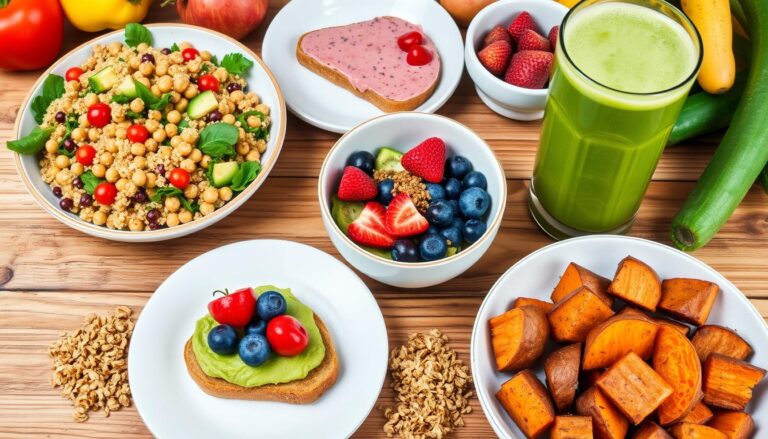Table of Contents
I’ve always been into fitness, but finding the right food after working out was tough. Switching to vegan, I wanted to find the best plant-based foods for my body. After lots of research and trying different things, I’m excited to share my findings with you.
This guide is for anyone looking to boost their fitness with vegan meals. We’ll talk about the importance of protein and carbs. Plus, we’ll explore the best Plant-Based Recovery Foods to help you reach your fitness goals.
Ready to see how Meatless Muscle-Building Meals can change your game? Let’s dive into the world of vegan fitness together. Together, we’ll take your recovery to the next level!
Importance of Post-Workout Nutrition
Fueling your body right after a workout is key for muscle recovery and growth. The post-workout time is when your body is ready to refill energy, fix muscle damage, and get ready for the next workout. Using Vegan Protein Sources and Plant-Powered Workout Recovery can greatly impact your fitness journey.
Understanding the Recovery Process
Exercise causes tiny muscle tears that need fixing. Giving your body the right nutrients, especially protein, starts this repair. Eating a balanced meal or snack within 30-60 minutes after working out can greatly benefit your recovery.
Role of Protein in Muscle Repair
Protein is essential for muscle repair and growth. Aim for one gram of protein per pound of body weight daily, or two grams per kilogram for the metric system. Using Vegan Protein Sources like beans, lentils, and plant-based protein powders can help meet your protein needs.
Essential Nutrients for Energy Restoration
Carbohydrates are also key for refilling glycogen stores used during exercise. The best ratio for post-workout nutrition is 3:1 carb to protein. Choosing nutrient-dense carbs like whole grains, fruits, and vegetables supports recovery.
“Proper post-workout nutrition is the key to maximizing the benefits of your training and setting the stage for your next workout.”
The right post-workout nutrition depends on your workout type, goals, and dietary needs. Talking to a registered dietitian or nutritionist can help create a personalized plan for Vegan Protein Sources and Plant-Powered Workout Recovery.
Top Nutrients for Vegan Post-Workout Meals
When it comes to Vegan Pre and Post-Workout Nutrition, it’s key to have the right nutrients. These help your body recover and repair muscles without meat. Plant-based proteins, complex carbs, and healthy fats are essential for this.
Proteins: Plant-Based Sources
Protein is vital for muscle repair and growth. A vegan diet has many plant-based sources. Legumes like beans, lentils, and peas are great because they have all the amino acids your body needs.
Tofu, tempeh, and seitan are also good for Vegan Pre and Post-Workout Nutrition. They can be added to your meals after working out.
Carbohydrates: Quick Energy Boosts
To refill energy lost during exercise, choose complex carbs. Quinoa, sweet potatoes, and whole-grain breads are good choices. They give you energy slowly, helping you recover and stay energized.
Healthy Fats: Supporting Overall Recovery
Healthy fats, like those in nuts, seeds, and avocados, are important for recovery. They help reduce inflammation and support hormone balance. They also aid in cell repair, which is crucial for healing and muscle growth.
By focusing on these nutrients, you can make vegan meals that help your body recover. This way, you can reach your fitness goals without meat.
Quick and Easy Vegan Meal Ideas
For gym-goers and fitness fans, quick, easy meals after workouts are key. These meals are packed with nutrients to help muscles recover and energy levels bounce back. They fit perfectly with a plant-based diet.
Smoothies for Instant Nutrition
Smoothies are a top pick for quick, nutritious meals. Mix plant-based protein powder, fruits, greens, and healthy fats like nut butter or avocado. This blend is rich in nutrients and easy to drink.
Energy-Boosting Protein Bars
Making your own protein bars is a great way to refuel. Use nuts, seeds, dried fruits, and plant-based protein powder. These bars are full of energy and easy to take on the go.
Hearty Grain Bowls
Grain bowls are a filling choice for post-workout meals. They include quinoa, brown rice, legumes, and roasted veggies. These ingredients offer a mix of proteins, carbs, and fats to aid in muscle recovery and energy replenishment.
| Vegan Protein Source | Protein Content per Serving |
|---|---|
| Seitan | 35g per 4 oz |
| Lentils and Beans | High in Protein, Fiber, Iron, and Magnesium |
| Tofu | Versatile Textures, 14g Protein per Serving |
| Tempeh | 19g Protein per 4 oz Serving |
| Soy Curls | 11g Protein per 120 Calories |
Adding these quick, easy vegan meals to your routine helps your body recover and grow. They provide the nutrients needed for muscle repair and energy boost.
Nutrient-Packed Smoothie Recipes
Adding smoothies to your post-workout routine can change your game. These tasty Plant-Based Recovery Foods are quick and easy to get. They give you a big dose of vitamins, minerals, and macronutrients to help your muscles heal and your energy come back.
Berry-Banana Protein Smoothie
This smoothie mixes berries, banana, and plant-based protein powder. It’s full of carbs, protein, and healthy fats to start your recovery. Almond milk makes it creamy and adds calcium and vitamin E.
Spinach and Avocado Green Smoothie
This green smoothie is packed with spinach, avocado, and chia seeds. It’s a mix of protein, fiber, and healthy fats. It helps refill your energy, repair muscles, and keeps you full.
Tropical Mango and Coconut Delight
Take a trip to the tropics with this smoothie. It has mango, coconut water, and plant-based protein. It’s a tasty way to refuel and rehydrate after working out. Hemp seeds add Omega-3 fatty acids for recovery.
Adding these smoothie recipes to your routine can really help your recovery and fitness. They give you the right mix of proteins, carbs, and fats. This way, you fuel your body with what it needs to do well.
Delicious Grain Bowl Combinations
After a tough workout, Vegan Post-Workout Meals are key for recovery. They should have complex carbs and plant-based proteins. Grain bowls are great because they’re tasty and full of nutrients.
Quinoa and Black Beans Power Bowl
This bowl mixes quinoa’s protein with black beans’ fiber. Add creamy avocado, zesty salsa, and fresh cilantro. It’s a flavor blast that will make your taste buds happy.
| Nutrient | Amount per Serving | % Daily Value |
|---|---|---|
| Calories | 381 | – |
| Fat | 19g | – |
| Carbohydrates | 43g | – |
| Protein | 16g | – |
| Dietary Fiber | 13g | – |
| Vitamin A | 3764IU | 75% |
| Vitamin C | 55mg | 61% |
| Folate | 342mcg | 85% |
| Sodium | 188mg | 8% |
| Calcium | 126mg | 10% |
| Iron | 5mg | 26% |
| Magnesium | 161mg | 38% |
| Potassium | 1066mg | 23% |
Brown Rice with Roasted Vegetables
This bowl has brown rice and roasted veggies like zucchini and bell peppers. Add crispy tofu for a mix of carbs, protein, and nutrients. It’s perfect for Meatless Muscle-Building Meals.
Lentil and Sweet Potato Delight
This meal is full of fiber, protein, and carbs. It combines lentils and sweet potatoes. Add sautéed kale and tahini dressing for a tasty treat.
Vegan Protein Sources
As a vegan athlete or fitness lover, getting enough protein is key for muscle repair. The plant-based world has many vegan protein sources to support your active life. Legumes, nuts, and seeds are all packed with nutrients your body needs.
Legumes: Beans, Lentils, and Peas
Legumes are top plant-based recovery foods. Lentils have about 18 grams of protein per cup. Chickpeas and black beans offer 15 grams each per cup. Edamame, a soy-based snack, has 18 grams of protein per cup, great for refueling after workouts.
Nuts and Seeds: A Crunchy Boost
Nuts and seeds are not just tasty, but also high in protein. Hemp seeds have 31.5 grams of protein per 100 grams. Almonds and pumpkin seeds have 21 and 19 grams, respectively. Adding these vegan protein sources to your meals and snacks gives you a protein boost and a satisfying crunch.
Tofu and Tempeh: Versatile Proteins
Soy-based products like tofu and tempeh are great vegan protein sources for recovery. Tofu has about 8 grams of protein per 100 grams. Tempeh has 21 grams per 100 grams. These ingredients can be made in many tasty ways to help you reach your fitness goals.
By mixing different vegan protein sources into your diet, you can give your body the nutrients it needs for recovery. Try out different plant-based proteins to find the best ones for your plant-based recovery foods.

Hydration: The Unsung Hero
When it comes to Dairy-Free Post-Exercise Refueling and Plant-Powered Workout Recovery, water is key. It helps move nutrients, keeps your body cool, and aids muscles after a workout.
Importance of Water Post-Workout
After a tough workout, your body loses fluids and salts. Drinking water helps replace these, letting your muscles heal and grow back stronger. It also helps nutrients get to your cells, speeding up recovery.
Electrolyte-Replenishing Drinks
Drinks rich in electrolytes are also important for Dairy-Free Post-Exercise Refueling and Plant-Powered Workout Recovery. Coconut water, citrus drinks, and a bit of salt can replace lost salts. This helps your muscles work right and stops cramps.
Try making a chocolate milk substitute with plant-based milk and cocoa powder. It’s tasty and full of carbs, proteins, and salts to help you recover after a workout.
“Proper hydration is essential for optimal muscle recovery and performance. Prioritize water and electrolyte-rich drinks to fuel your Plant-Powered Workout Recovery.”
Meal Prep Tips for Post-Workout Success
Keeping up with your fitness and eating right after working out is key for recovery and muscle growth. Planning and preparing your meals ahead of time is a smart move. This way, you can enjoy tasty, Gym-Friendly Vegan Recipes and Meatless Muscle-Building Meals whenever you need them.
Planning Ahead for Convenience
Start by looking at your weekly schedule and planning your meals. Choose a few Gym-Friendly Vegan Recipes to make in bulk. This could include:
- Preparing large batches of whole grains like quinoa, brown rice, or farro
- Cooking up a big pot of lentils or beans
- Roasting trays of vegetables like sweet potatoes, broccoli, and cauliflower
Batch Cooking and Storage Ideas
With your ingredients ready, you can quickly make Meatless Muscle-Building Meals like grain bowls and vegetable stir-fries. Store these in airtight containers in the fridge for up to 4 days. Or, freeze them for later. This way, you can easily refuel after a workout.
By spending a bit of time planning and prepping, your fridge will be stocked with healthy, Gym-Friendly Vegan Recipes. This makes it simple to fuel your fitness goals and aid in recovery.

Vegan Snacks for On-the-Go Recovery
For Cruelty-Free Fitness Fuel and a healthy Vegan Pre and Post-Workout Nutrition routine, having the right snacks is key. Options like nut butters and roasted chickpeas are perfect. They offer protein, healthy fats, and carbs for quick recovery after a workout.
Nut Butter on Rice Cakes
Nut butters, like almond or peanut butter, are tasty and filling. Spread them on whole-grain rice cakes for a snack that’s easy to take with you. The nut butter’s healthy fats and protein help with muscle recovery. The rice cake’s carbs give you energy.
Roasted Chickpeas for Crunchy Snacking
Roasted chickpeas are a great Cruelty-Free Fitness Fuel choice. They’re full of protein, fiber, and carbs. They’re a healthier snack than chips or crackers. Season them with your favorite spices for a tasty, protein-rich snack.
Dried Fruit and Nut Mixes
Making your own trail mix is a smart way to refuel. Mix dried fruits, nuts, and seeds for a snack that’s full of energy and nutrients. You can make it to your liking, so it fits your diet and taste.
Choosing Cruelty-Free Fitness Fuel means picking snacks that are full of nutrients. These snacks give you energy and help you meet your Vegan Pre and Post-Workout Nutrition goals. With a bit of creativity, you can enjoy delicious, healthy vegan snacks for your fitness journey.
Common Mistakes in Post-Workout Vegan Nutrition
Starting your journey with Plant-Based Recovery Foods and Vegan Post-Workout Meals? Watch out for common mistakes. Skipping meals and not getting enough protein are big no-nos.
Skipping Meals: Why It’s a Bad Idea
Skipping meals after a tough workout can really set you back. Your body needs nutrients to fix muscles and recover. Skipping these meals can slow down muscle repair and hurt your performance.
Underestimating Protein Needs
Protein is key for muscle repair after exercise. Vegans might think they don’t need as much, but they do. Aim for 20-30 grams of plant-based protein after your workout. Spread it out throughout the day to help your muscles recover and grow.
To get enough protein, eat a variety of plant-based foods. Here are some good sources:
- Legumes (beans, lentils, and peas)
- Nuts and seeds
- Tofu and tempeh
Avoid these mistakes and focus on your post-workout nutrition. This will help you get the most out of your Plant-Based Recovery Foods and Vegan Post-Workout Meals. It will support your fitness goals and overall health.
“Proper nutrition is just as important for athletes as training itself.”
Conclusion: Fueling Your Journey
Starting your plant-powered fitness journey? A well-planned vegan diet can help with muscle recovery and growth. Eat a variety of plant-based proteins, complex carbs, and healthy fats. This will fuel your workouts and help repair muscles.
Making Vegan Meals Work for You
Timing is key for post-workout nutrition. Try to eat a balanced meal or snack within 30-60 minutes after working out. Mix different plant-based proteins, complex carbs, and healthy fats to see what works for you.
Embracing Variety for Maximum Benefit
Being consistent with your diet and training is crucial on a vegan diet. Include a variety of plant-based proteins like legumes, nuts, seeds, and whole grains. This ensures you get enough protein for Plant-Powered Workout Recovery and Meat-Free Muscle Repair Meals. Variety not only nourishes your body but also keeps your taste buds excited.

1 thought on “Best Vegan Post-Workout Meals for Optimal Recovery and Strength Building”
Comments are closed.